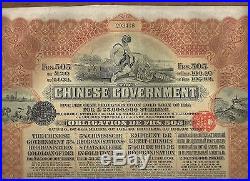
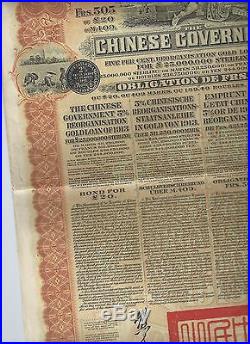
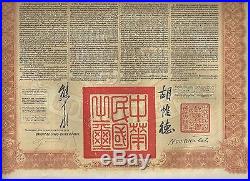
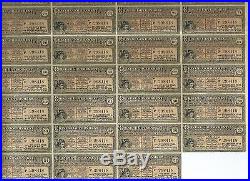
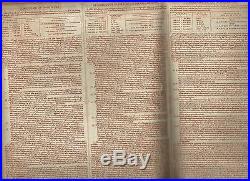

China Chinese 5% Government Reorganisation Gold bond of 1913. Genuine, Original, Authentic 1913 China Reorganization Gold Loan of 1913. Gold Loan of 1913. With 43 coupons originally attached. 20 British Pounds denomination, 505 Francs. Printed in four languages: English, German, French, & Russian. Three stunning vignettes plus two red chop prints at the bottom (including the seal of the Chinese Minister in Paris). Embossed orange British 8 shillings stamp and black 1913 French stamp. Quality printing by Waterlow & Sons, Limited, London. Hand signed by the representative of Banque de Indo-Chine a Paris, as the countersignature for identification of the bank. A fantastic historical document that should be in everyone’s collection. More info courtesy ofWikipedia. On January 1, 1912, Sun officially declared the establishment of the Republic of China and was inaugurated in Nanjing as the first Provisional President. However, power in Beijing already had passed to Yuan Shikai, who had effective control of the Beiyang Army, the most powerful military force in China at the time. To prevent civil war and possible foreign intervention from undermining the infant republic, Sun agreed to Yuan’s demand for China to be united under a Beijing government headed by him. On March 10, in Beijing, Yuan Shikai was sworn in as the second Provisional President of the Republic of China. A poster that commemorates permanent President of the Republic of China Yuan Shikaiand provisional President of the Republic Sun Yat-sen. The republic which Sun Yat-sen and his associates envisaged evolved slowly. Although there were many political parties vying for supremacy in the legislature, the revolutionists lacked an army, and soon Yuan Shikai’s power began to outstrip that of parliament. Yuan revised the constitution on his own and became dictatorial. In August 1912 the Kuomintang (Nationalist Party) was founded by Song Jiaoren, one of Sun’s associates. It was an amalgamation of small political groups, including Sun’s Tongmenghui. In the national elections held in February 1913 for the new bicameral parliament, Song campaigned against the Yuan administration, whose representation at the time was largely by the Republican Party, led by Liang Qichao. Song was an able campaigner and the Kuomintang won a majority of seats. Song was assassinated in March. Some people believe that Yuan Shikai was responsible, and although it has never been proven, he had already arranged the assassination of several pro-revolutionist generals. Animosity towards Yuan grew. In April he secured a Reorganization Loan of 25 million pounds sterling from Great Britain, France, Russia, Germany and Japan , without consulting the parliament first. The loan was used to finance Yuan’s Beiyang Army. On May 20 Yuan concluded a deal with Russia that granted Russia special privileges in Outer Mongolia and restricted Chinese right to station troops there. Kuomintang members of the Parliament accused Yuan of abusing his rights and called for his removal. On the other hand, the Progressive Party (Chinese: ; pinyin: Jìnbùdng), which was composed of constitutional monarchists and supported Yuan, accused the Kuomintang of fomenting an insurrection. Yuan then decided to use military action against the Kuomintang. In July 1913 seven southern provinces rebelled against Yuan, beginning the Second Revolution (Chinese: ; pinyin: Èrcì Gémìng). There were several underlying reasons for the Second Revolution besides Yuan’s abuse of power. First was that most Revolutionary Armies from different provinces were disbanded after the establishment of the Republic of China, and many officers and soldiers felt that they were not compensated for toppling the Qing Dynasty. These factors gave rise to much discontent against the new government among the military. Secondly, many revolutionaries felt that Yuan Shikai and Li Yuanhong were undeserving of the posts of presidency and vice presidency, because they acquired the posts through political maneuvering rather than participation in the revolutionary movement. Lastly, Yuan’s use of violence (such as Song’s assassination) dashed the Kuomintang’s hope of achieving reforms and political goals through electoral means. However, the Second Revolution did not fare well for the Kuomintang. The leading Kuomintang military force of Jiangxi was defeated by Yuan’s forces on August 1 and Nanchang was taken. On September 1, Nanjing was taken. When the rebellion was suppressed, Sun and other instigators fled to Japan. In October 1913 an intimidated parliament formally elected Yuan Shikai President of the Republic of China, and the major powers extended recognition to his government. Duan Qirui and other trusted Beiyang generals were given prominent positions in the cabinet. To achieve international recognition, Yuan Shikai had to agree to autonomy for Outer Mongolia and Tibet. China was still to be suzerain, but it would have to allow Russia a free hand in Outer Mongolia and Tanna Tuva and Britain continuation of its influence in Tibet. The item “China Chinese Government Reorganisation Gold bond 1913 with 43 coupons US seller” is in sale since Monday, September 19, 2016. This item is in the category “Coins & Paper Money\Stocks & Bonds, Scripophily\World\Asia”. The seller is “antiquestocks*com” and is located in Concord, California. This item can be shipped worldwide.
